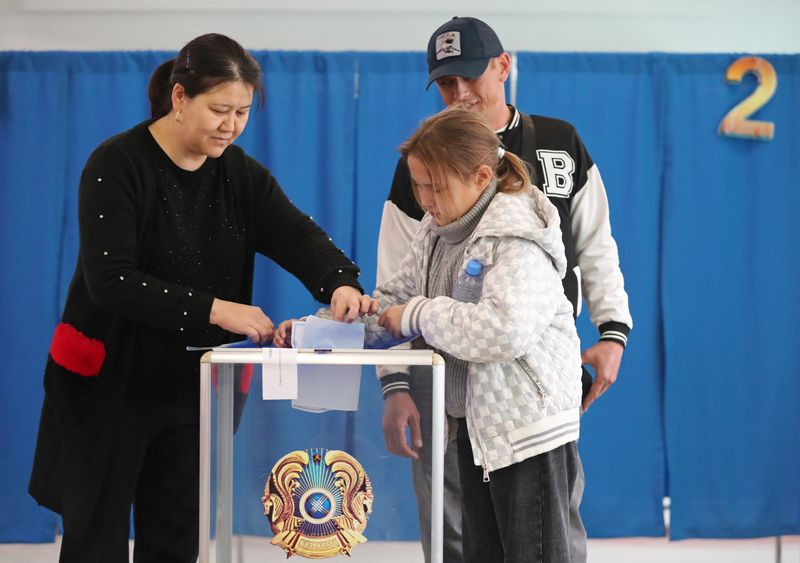ULKEN, Almaty region, Kazakhstan (Reuters) -Kazakhstan voted in a referendum on Sunday on whether to build its first nuclear power plant, and an exit poll showed voters backed the idea floated by President Kassym-Jomart’s cabinet Tokayev was promoted as a way to phase out. polluting coal-fired power stations.
The plan has drawn public criticism over concerns about associated dangers, the legacy of Soviet nuclear testing and fears that Russia will be involved in the project.
Nearly 64% of registered voters cast their votes before 8pm local time (1500 GMT) when polling stations closed, the Central Election Commission said, making the vote valid.
The Commission will announce preliminary results on Monday, but an exit poll of around 284,000 voters showed 69.8% of them voted in favor of the plan, local pollster SOCIS-A said hours after voting ended.
“I have come to the conclusion that the decision to build the nuclear power plant, and to build it together with (Russian state nuclear company) Rosatom, has already been made in (Tokayev’s office) and the people of Kazakhstan are invited to polling stations as ‘notaries’ to ratify this decision with their votes,” wrote popular blogger Vadim Boreiko.
In the village of Ulken on the shores of Lake Balkhash, in the southeast of the country, which the cabinet has identified as a site for the construction of the factory, some locals hoped the project would create jobs. Others expressed concerns about the impact on lake water quality.
“I support the power plant,” said Dametken Shulgeeva, who has lived in the village of 1,200 residents for more than 20 years. “This is our future.”
Despite its significant reserves, the Central Asian country of 20 million people is largely dependent on coal-fired power stations for its electricity, supplemented by some hydroelectric power stations and the growing renewable energy sector.
Kazakhstan already imports electricity, mainly from Russia, as its facilities, many of which are old, struggle to meet domestic demand. And coal is seen as the most polluting energy source.
Soviet legacy
The government says a reliable energy supply is needed to complement renewable sources such as solar and wind power, and since Kazakhstan is one of the world’s largest uranium producers, nuclear power is a logical choice.
“In order not to remain on the sidelines of global progress, we must leverage our competitive advantages,” Tokayev said before the vote.
However, the former Soviet republic does not enrich uranium to the point where it can be used as fuel. The government estimates that building a nuclear power plant would cost between $10 and $12 billion and expects contractors to secure the financing.
Critics say the same goal can be achieved with gas-fired power stations, which, while still using fossil fuels, are far less polluting than coal-fired power stations and pose fewer risks.
Kazakhstan was part of the Soviet Union in 1986 when the Chernobyl nuclear disaster occurred, and tens of thousands of Kazakhs took part in the subsequent clean-up operation, leaving many with lifelong health problems.
The country was also the site of hundreds of Soviet nuclear weapons tests that made parts of the country uninhabitable, led to disease among people in nearby areas, and made many people suspicious of all things nuclear.

Tokayev, who publicly cast his vote in the capital Astana, told reporters he had no country or company in mind as a potential contractor.
“My personal view on this issue is that an international consortium consisting of global companies that have the most advanced technologies should work in Kazakhstan,” he said.


